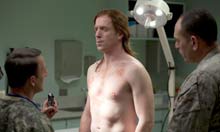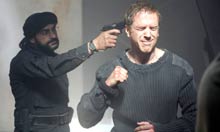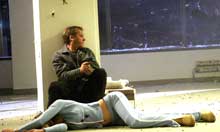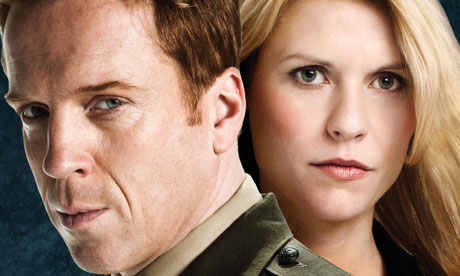Survey Damian Lewis's CV and you'll find he's had a string of roles that required him to exude a certain kind of laconic, tight-lipped, battle-hardened maleness, holding it together as things fall apart. In 1999, he starred as a lieutenant in Warriors, a BBC production about British peacekeepers. He then crossed the Atlantic and starred first as Major Winters in Spielberg's Band Of Brothers, and then in Life as Charlie Crews, a detective imprisoned for a crime he didn't commit. Now, in new US drama Homeland, he's playing Sergeant Nicholas Brody, a marine who, while held captive in Iraq, might have been turned by al-Qaida. It's perhaps his most testing role to date, but one in which Lewis proves remarkably effective.
Those are the roles, but then there is Damian Lewis, actor, who breezes into the library of a Soho hotel, cheery and effusive in a big scarf, yellow buttonhole and slimcut jacket. He reminisces about hanging with fellow Etonian Dominic West and tracking down George Clooney's party at the Golden Globes (Lewis was a Best Actor nominee), generally holding forth 19 to the dozen as he tucks into a breakfast order of pancakes, maple syrup and bacon. The contrast with the characters is quite astonishing, like Sean Bean turning out in real life to be more like Russell Brand.
"I do have this dual persona," admits Lewis, who spends seven months of the year in the UK and five in the US. Does he maintain the American accent when he's working in the States? "I do! I'm one of those idiots," he roars. "When I'm working in America, I wake up with an American accent and stay with it all day till makeup comes off. I just want everyone to be at ease, and not have the show's creators think, 'Oh my god, he's so English, why did we hire him?'"
 Damian Lewis bares all in the Homeland pilot. Photo: Jim Bridges/Showtime
Damian Lewis bares all in the Homeland pilot. Photo: Jim Bridges/Showtime
Hire him they do, however, most recently in Homeland, which debuts in the UK this week. It's made by Howard Gordon and Alex Gansa, both of whom worked on 24. But whereas that series eventually palled for many, Homeland – while equally gripping as it twists and unfurls – might find greater longevity thematically and in its central characters (Claire Danes won a Golden Globe for her role as a tenacious loose-cannon CIA agent with a bipolar condition). If 24 espoused a wishful, bravura sense of America as the world's most effective global policeman, attaining results via methods that weren't always for the squeamish, Homeland is more reflective and ambivalent, more conscious of the blowback that can result from ill-considered overseas intervention, bringing home the anger and resentment bred by US foreign policy.
"24 was a muscular, macho response to 9/11 and Kiefer was always going to save us," says Lewis, who marched against the war with Iraq and shares the disaffection with western leadership that informs Homeland, a series he describes as "more liberal". "The world went to war against terror and this has fostered greater uncertainty," he says, "especially concerning our own governments."
It falls to Lewis to internalise the disillusionment that's a key theme of Homeland – a role to which he seems inordinately suited. He exudes a preternatural, smouldering presence on the small screen, yet it's a presence that – for someone with an upbringing in theatre – was neither instinctive nor unconscious, and had to be worked at.
I thought I'll always be too big and fruity, too red for the camera
"All my heroes and aspirations were in the theatre; I didn't watch much TV growing up because I wasn't allowed to." he says. "So I went to the RSC and thought I was going to miss that moment. I thought I'll always be too big and fruity, too red for the camera. But one of the things I learned from watching De Niro [films] was: if you think it, the camera will see it."
As Sergeant Brody, Lewis is required to play a character fighting to keep up appearances for an appreciative nation while subduing a roiling mass of conflicting emotions. With each episode the extent of what he has become, what has been done to him and what he, in turn, intends to do becomes broader and more shocking. Once again, you wonder how this seething, measured depiction of silent, inner strength – which feels very much in an American tradition – comes out of a well-educated chap like Lewis. With some reluctance, perhaps because of the class issues it touches on, he suggests a possibility.
"I went to boarding school," he says. "And what that teaches you is to cope emotionally at a young age, and to suppress emotions like homesickness; it creates in you a whole new set of social skills. You learn about how to deal with the group that you're in, and to suppress a lot of emotion so you don't let anyone in too much. Being in the army is, in a way, similar. Yes, you might be looking for improvised explosive devices on the roadside in Afghanistan and be on the verge of tears, but you don't let anyone know that."
And so, prior to making Band Of Brothers, when he was required to spend 10 days in boot camp by way of preparation, Lewis found that he was more able to cope with the discipline than some of his fellow actors, used to the more "unstructured, dissolute" actor's life. "Boarding schools are regimented," he says. "Your days are laid out for you from eight in the morning till eight at night. So for me, boot camp brought back flashbacks of boarding schools. It's too easy to say, 'We're all like that, us types' – but it must help."
 Damian Lewis on the end of it in Homeland. Photo: Jim Bridges/Showtime
Damian Lewis on the end of it in Homeland. Photo: Jim Bridges/Showtime
Like Dominic West and Hugh Laurie, Lewis is one of a procession of UK actors who have made the trek across the Atlantic in search of more substantial and sustained dramatic roles. Alongside Breaking Bad and Boardwalk Empire, the ambition of Homeland casts UK drama in a thin light by comparison. It's not for want of British talent; it's simply that the UK can't compete with the scale of operations such as HBO and Homeland's producers Showtime.
"It's an unfair comparison because when things are developed in the UK, they're developed at script stage only," says Lewis. "In America, the development goes through to spending $5m on a pilot. Still, when I first went to America to film Life, there were Americans saying to me, 'Why are you doing a show like this? A cop show? It's so generic, Jeez! We love your English drama, it's so much more original and exciting.' So the grass is greener. But I do find that the best American TV achieves a density of ideas, story and character that we don't even attempt; one of those things is always missing and it makes for a thinner soup, in my view."
Lewis has not forsaken the UK; he'll be appearing in Nick Love's remake of The Sweeney, imaginatively cast as Regan's boss. Moreover, he's given vent to his lighter, garrulous, Brit self in hosting Have I Got News For You, which he clearly relished. "I don't think I've been more excited about being offered a job," he says. "It's unquestionably my favourite programme. I loved it, I really loved it. And this is my plug to do it again."
When asked if he'd really like to do more comedy, however, Lewis rubs his chin doubtfully.
"In the end, there's something of the puritan work ethic about me that roles really must sustain me on an intellectual level," he says. "I'd feel guilty just doing gags. Part of the joy for me is in learning from a role."
You mean, like De Niro, spending a year as a New York cabbie before he made Taxi Driver?
"Oh no no, I don't want to work that hard, that's just bonkers! 'Why don't you just try fucking acting, darling?', as Laurence Olivier said. I want to keep pretending, otherwise where's the therapy?"
THE WAR ON TERROR ON TV
24 sets the agenda
 Kiefer Sutherland in 24. Photo: 20thCFox/Everett/Rex
Kiefer Sutherland in 24. Photo: 20thCFox/Everett/Rex
Dammit! Over the course of eight sleepless days, one-man army Jack Bauer became synonymous with the "war on terror", though it was commissioned before 9/11. The show's ticking clock and running/shooting/shouting into mobile phones motifs added a sense of urgency, while Jack's default use of torture in the face of increasingly high stakes (assassination plots, deadly viruses, nuclear bombs) felt both uncomfortably close to, and perfectly in tune with, the Bush regime.
Terror-vision
After 24, terrorism became almost a sub-genre. Dennis Haysbert (AKA 24's President Palmer) headed up his own counter-terrorist outfit on The Unit; The Grid paired CIA and MI6 agents (well, Julianna Margulies and Bernard Hill); and Spooks spent 10 years foiling various plots.
The enemy within?
In the wake of the London bombings in 2005, Peter Kosminsky's two-parter Britz explored British-born Islamist extremism, with Riz Ahmed and Manjinder Virk as siblings on either side. Sleeper Cell, the US take on homegrown radicalism came with the tagline "Friends. Neighbors. Husbands. Terrorists."
War as real-time drama
TV also dramatised the ongoing conflict in Iraq: Generation Kill followed marines during the 2003 invasion; Over There looked at the impact on serving soldiers and their families; Occupation had Brit soldiers James Nesbitt and Stephen Graham drawn back to Basra; even ER followed Dr Gallant on a tour of duty.
And elsewhere …
When it came to al-Qaida, Tony Soprano was on the side of the law, ratting out suspects to the Feds; on The Wire, McNulty's FBI pal Fitz moved from drug busts to counter-terrorism; the CSI team faced teen bomber Justin Bieber; and on Arrested Development, the dodgy mansions George Bluth Sr built in Iraq turned out to be funded by the CIA.



